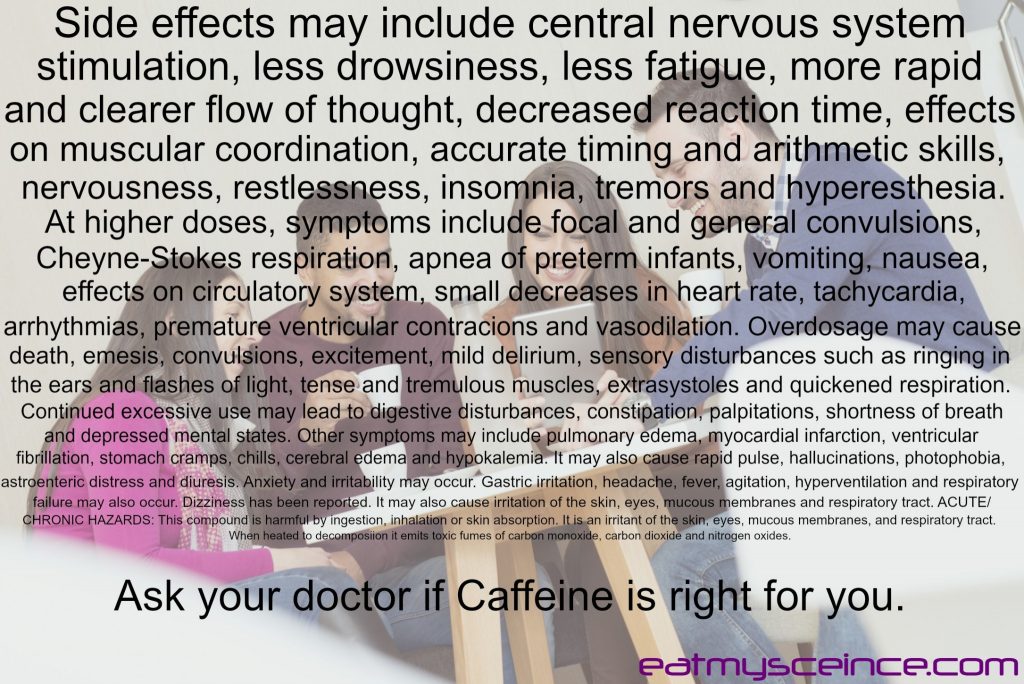It was early morning and my eyes could barely stay open as I trudged to the kitchen to turn on my trusty red coffee maker. I expected to hear the machine steam and bubble, the smell of my favorite vanilla macadamia nut coffee filling the kitchen. But instead, there was silence.
I filled my water bottle, still waiting to hear and smell my morning routine, but there was nothing. No java goodness was brewing in my poor little red coffee maker.
Over 68 million Americans would panic in this situation. And that’s just the coffee drinkers. In the US, more than 90% of adults consume caffeine on a regular basis [1].

Most of us know caffeine can be addictive, but there are some other random facts about the drug you should know.
1. Caffeine is produced naturally by plants – as a pesticide
Why does caffeine exist? To kill bugs, of course! Plants make the chemical to paralyze and kill predators that try to eat them. It can kill us too. Luckily we are a lot bigger than most bugs. It takes about 5 grams, or well over 30 cups of coffee, to kill an average human. Sadly, there are documented deaths from too much caffeine [1,2,3].
2. Some people are unaffected by caffeine
My mom can drink a cuppa joe at 9:30 PM, then settle in for a long winter’s nap. While most coffee drinkers can understand building a tolerance to the effects, about 10% of people are just not very sensitive to it. Either the liver metabolizes the caffeine too quickly, or it can’t bind to the right receptors (how it keeps you awake) [4].
I did not get those genes from my mom. Which is good I guess, or I never would have made it through college #allnighters
3. Caffeine does not stunt your growth.
I was always told as a kid that drinking coffee would stunt my growth. There is absolutely no evidence that caffeine stunts growth in adolescents. In the early 1900’s C.W. Post (of Post cereal fame) developed a powdered drink called Postum as a non-caffeinated coffee alternative. The company used a negative add campaign against coffee and one of the attacks was that it kept kids from growing correctly [5]. So your great-grandmother wouldn’t let your grandmother drink coffee, your grandmother wouldn’t let your mother drink coffee, and your mother wouldn’t let you drink coffee, all because of false advertising. Now parents give their kids caffeine on purpose.

4. Some parents use caffeine as a non-prescription treatment for ADHD
ADHD can be treated with stimulants, and some parents swear caffeine turns their kid into the student of the month. Caffeine has been researched as an effective treatment for ADHD, but other drugs are more effective (and more profitable?) As mentioned above, about 10% of people don’t respond to the drug, so the treatment won’t work for every kid. If it works for yours, though, awesome! [6]
5. If caffeine was a regulated drug, coffee commercials would be 2 minutes long
Imagine a commercial, some good looking 20-somethings enjoying a laugh over a latte at a trendy coffee shop. At the end, like the prescription drug ads, the deep voice comes over –

Well, thank goodness coffee is a drug that doesn’t require a prescription. I met my dealer (Starbucks) to get my fix then headed to Target to get a new coffee maker. I hope this one lasts. They just don’t make them like they used to.
I remember those college nights 🙂 although I wasn’t drinking coffee, still don’t really. Maybe a capaccino every once in a while but very rare. Good article either way!
If I remember correctly, we kept each other awake by throwing M&Ms at the sleeping person. Much better than caffeine!
Caffeine triggers migraines for me. Had to stop all caffeine drinks and guess what? I don’t miss them. BTW, never was a coffee drinker.
It’s so interesting how different our bodies deal with caffeine. For a lot of people, caffeine helps get rid of headaches! Then for you and others, they trigger them. I wouldn’t ever have caffeine if it did that to me.
Fun facts! I wish I was less addicted to caffeine :/
I feel that way sometimes, too. It’s part of my morning routine, but I sometimes wonder what would happen if I switched to decaf. Would it still be part of my routine? Is it the hot beverage that I like, or the caffeine? Who am I kidding. It’s the caffeine.
De tout coeur avec toi Serge, c’est un beau projet qui voit enfin le jour et que nous suivrons avec passion! Comme tu peux t’en douter… Nous t’embrassons bien fora;!!!Stndra&!Tib
Great read! I have my French Vanilla cappuccino every morning. If not, major headache.
I get the headache too! I wonder, for those 10% whose bodies don’t react to the caffeine – if they stop, do they get a headache? Hmmm…
Strangely, I think my body doesnt accept caffeine the way I would like it to. I am just a tea drinker!
It’s amazing to me how people react differently to caffeine! Does your body not respond to it at all, or does it make you feel uncomfortable?
Good job Jadie!! Marylee
Thank you!
Great article Jadie! I guess o2n this case the apple fell and rolled away from the tree a bit 🙂
I love my coffee in the morning, delicious and no calories, have cut the number of cups as time gets along…but I do enjoy the aroma and warm taste!
Sounds like everyone is affected differently!
Always, Mama
So I have a question – if you don’t drink coffee, do you get a headache?
Well yes, years ago in attempt to cut the coffee bad, I mean bad, headaches came on. However, I have no idea if I would now because I haven’t stopped since then! 🙂